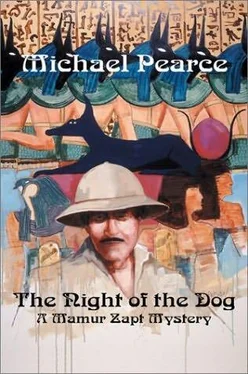Michael Pearce - The Mamur Zapt and the Night of the Dog
Здесь есть возможность читать онлайн «Michael Pearce - The Mamur Zapt and the Night of the Dog» — ознакомительный отрывок электронной книги совершенно бесплатно, а после прочтения отрывка купить полную версию. В некоторых случаях можно слушать аудио, скачать через торрент в формате fb2 и присутствует краткое содержание. Жанр: Исторический детектив, на английском языке. Описание произведения, (предисловие) а так же отзывы посетителей доступны на портале библиотеки ЛибКат.
- Название:The Mamur Zapt and the Night of the Dog
- Автор:
- Жанр:
- Год:неизвестен
- ISBN:нет данных
- Рейтинг книги:3 / 5. Голосов: 1
-
Избранное:Добавить в избранное
- Отзывы:
-
Ваша оценка:
- 60
- 1
- 2
- 3
- 4
- 5
The Mamur Zapt and the Night of the Dog: краткое содержание, описание и аннотация
Предлагаем к чтению аннотацию, описание, краткое содержание или предисловие (зависит от того, что написал сам автор книги «The Mamur Zapt and the Night of the Dog»). Если вы не нашли необходимую информацию о книге — напишите в комментариях, мы постараемся отыскать её.
The Mamur Zapt and the Night of the Dog — читать онлайн ознакомительный отрывок
Ниже представлен текст книги, разбитый по страницам. Система сохранения места последней прочитанной страницы, позволяет с удобством читать онлайн бесплатно книгу «The Mamur Zapt and the Night of the Dog», без необходимости каждый раз заново искать на чём Вы остановились. Поставьте закладку, и сможете в любой момент перейти на страницу, на которой закончили чтение.
Интервал:
Закладка:
“I will see,” said Owen, “that he doesn’t.”
The sheikhs suddenly looked satisfied. Owen realized that was what they had come for. The personal assurance of the Mamur Zapt. In a society that was still traditional and oral, personal promises counted for a lot. In a way it was flattering that they should take his word. However, he knew that if he failed to live up to it they would not take his word again.
The kadi rose to his feet.
“Thank you for seeing us. My friends are very anxious that there should be no difference between their people and the Mamur Zapt, and will do all they can to see that things go no further, at least for the time being. Unfortunately”-he caught Owen’s eye meaningfully-“they cannot answer for others.”
With the usual extended Arabic farewells, the party was shown out. Owen accompanied them to the front entrance himself. He wanted to keep Nikos in the background.
The two sheikhs managed to keep control in their communities but in other ones there were disturbing incidents. Shops owned by Copts were attacked and wrecked and there were increasing instances of individual Copts being set upon in the streets. Zeinab became involved in one of these.
She frequently made use of Coptic craftsmen and one of them, a leather-worker, who had been repairing a handbag she was particularly fond of, was bringing it to her flat with his small son when he was attacked by a gang of youths. The boy ran on to the flats where Zeinab lived and rushed in at the entrance. Two of his attackers followed him and caught him and were about to drag him back out into the street when Zeinab came down the stairs. Zeinab had no great love of Copts but she wasn’t having anyone attacked in the entrance of her building and pitched into the youths with such fury that they ran off.
The boy, weeping and bleeding, recognized Zeinab as the lady they were coming to see and managed to stammer out the story of the attack on his father. Zeinab, who tended to see things in personal terms and who, having been brought up in her father’s house, had something of the great lady in her, took it into her head to protect her servants and rushed out into the street in a passion. She came upon the leather-worker further along the street surrounded by a mob of youths who were beating and kicking him.
Without thinking, she plunged into the mob, caught hold of the leather-worker and tried to drag him away from his assailants. The youths, being Moslems, were not having this from any woman, even if she were a great lady, and things would have gone ill for Zeinab if Owen had not arrived at that moment, on his way to her flat.
He caught hold of the two nearest him and knocked their heads together, kicked two more and grabbed the ringleaders. The others, thinking there was more of him, fled. Fortunately, none of them were armed. If they had been, it might have been a different story, for Owen himself only carried arms when he had reason to believe he might need them.
He put a neck-lock on the youth he was holding and looked around for help.
Now the fighting was over there was plenty forthcoming. He got some of the men to carry the leather-worker to Zeinab’s flat. Others went to fetch a policeman. When, some time later, one appeared, Owen handed the youth over to him with strict instructions to keep him in the local caracol until Owen would question him. Then he went to Zeinab’s flat.
Zeinab was sponging the boy’s face. His father had already been attended to and lay quiet and grateful on one of Zeinab’s sofas.
“You’re going to have to do something about this,” said Zeinab, looking up at him.
The caracol, one of the old ones, consisted of a single room underground. It was hot and foetid in there and Owen had the ringleader brought upstairs for questioning.
The boy was about fourteen years old and had the long, fuzzy hair of the dervish. He looked scared, not so much, Owen judged, because he was in the hands of the police but rather because he was in different surroundings from those he was used to, the modern, built-up, Europeanized part of the city and not the warren of tiny mediaeval streets he normally inhabited.
Owen sat on a chair in the cramped little office and made the boy stand in front of him.
“What is your name?” he asked.
“Daouad.”
“Where are you from?”
“I am from near the Sukkariya,” the boy growled.
“Well, Daouad, you will not see the Sukkariya again for a long time unless you answer my questions.”
The boy looked around like a trapped animal.
“Whose man are you?”
“I am no man’s man.”
“You come from the Sukkariya. You are a dervish. Who is your sheikh?”
“The Sheikh Osman Rahman,” the boy said reluctantly.
“Did he tell you to do this?”
The boy was silent.
“Will he be angry if I tell him what you have done?”
“No,” said the boy proudly. “He will be pleased.”
“Because you have done his bidding?”
“Because I have done what he wants.”
“How do you know it is what he wants?”
The boy would not say. After a moment, though, he looked away and muttered: “It was only a pig of a Copt.”
“There are always Copts. Why attack one now?”
“To avenge!” the boy said hotly. “To avenge the blow against one of ours! A death for a death!”
“Is that what the sheikh says?”
“It is what we all say.”
“There are other sheikhs who do not say it.”
“They turn the cheek,” the boy said, “when they should set their face in anger. They fold their arms when they should lift their hand in wrath. They let the faithless strike them when they should strike the faithless.”
The words had the ring of preacher’s rhetoric.
“Is that what the Sheikh Osman says?”
“Yes,” said the boy defiantly.
Owen had him taken back to the underground room. In a few days he would release him. There was no point in acting against him.
The Sheikh Osman Rahman, however, was a different matter.
Owen came up with him that evening. It was in a tiny square of the Old City. There was a dais on one side of the square on which the Sheikh Osman sat cross-legged. All around him, squatting on the ground, were his followers; and beyond them, around the outskirts and blocking up the mouths of the little streets which gave on to the square, was a wider, more disinterested audience. Those nearest the dais carried raised torches in their hands, so that the dais was illuminated and the sheikh clearly visible to all.
Owen stayed in one of the side streets and listened. The sheikh was only just getting into his stride. He spoke vehemently but quietly. He was expounding a sura, one of the parable-like stories of the Koran, extracting from it lessons for the faithful. As he pointed up the moral, contrasting the way of the good with the way of the bad, his voice deepened and became more indignant. Almost imperceptibly the exposition became a harangue. The crowd stirred and became involved. There were sympathetic cries. The sheikh now had moved into denunciation: of the wrongdoer, the infidel, those who mocked Islam. Of those who protected the infidel from the just wrath of the servants of Allah.
Owen waited for the words which would justify his own intervention. They came. Incitation to riot. His men, who knew the law as well as he, looked at him expectantly.
“Not yet.”
He did not want to do it in front of the crowd. That might provoke a riot, the very thing he was trying to avoid. He did sometimes break up meetings but that was usually when they were political. Religion you handled with kid gloves.
Afterwards. When the crowd was beginning to disperse.
He could sense his men fidgeting. This was always the difficult time. They were disciplined, though, Sudanis, hand-picked ex-soldiers from the south. They would do what they were told.
Читать дальшеИнтервал:
Закладка:
Похожие книги на «The Mamur Zapt and the Night of the Dog»
Представляем Вашему вниманию похожие книги на «The Mamur Zapt and the Night of the Dog» списком для выбора. Мы отобрали схожую по названию и смыслу литературу в надежде предоставить читателям больше вариантов отыскать новые, интересные, ещё непрочитанные произведения.
Обсуждение, отзывы о книге «The Mamur Zapt and the Night of the Dog» и просто собственные мнения читателей. Оставьте ваши комментарии, напишите, что Вы думаете о произведении, его смысле или главных героях. Укажите что конкретно понравилось, а что нет, и почему Вы так считаете.












